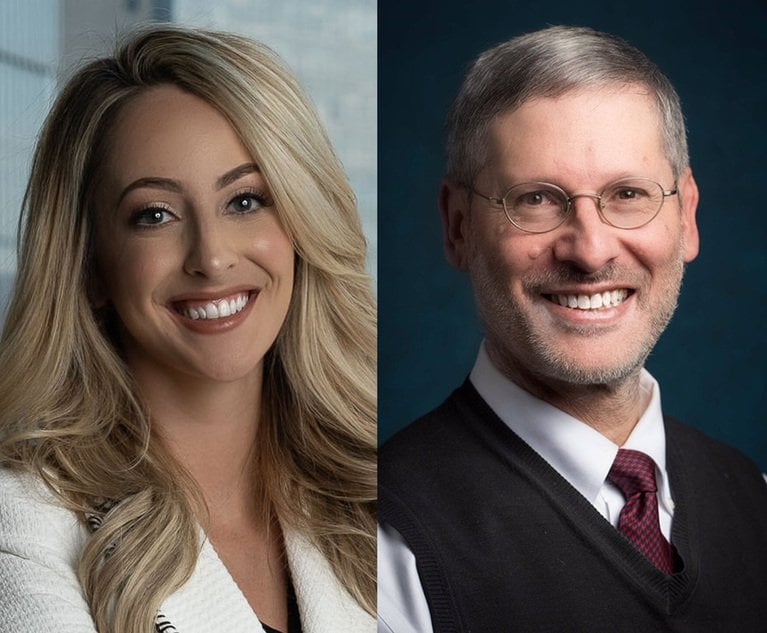 Helene M. Weiss (left), an associate with the Marsh Law Firm, and Daniel Pollack, a professor at Yeshiva University's School of Social Work. Courtesy Photos
Helene M. Weiss (left), an associate with the Marsh Law Firm, and Daniel Pollack, a professor at Yeshiva University's School of Social Work. Courtesy PhotosLegal Nuances of Child Sexual Experimentation vs. Grooming
Without a clear understanding of this distinction, children may be unnecessarily harmed. This can happen by inappropriately being accused of criminal behavior, or not being appropriately accused of criminal behavior. It can also occur when a child, for psychological or physiological reasons, is unable to follow a normative age-appropriate path of child development. Absent clarity, parents, and others who care for children, are unable to know exactly how to monitor children's behavior.
December 18, 2024 at 11:42 AM
6 minute read
It is challenging for parents and the state to oversee and regulate sexual behavior between young children. While every child is unique and grows in their own way, there is a general range of behaviors characteristic of child development. From a legal and policy perspective, what is the difference between age-appropriate child sexual experimentation and actions that might be characterized as child-on-child sexual grooming? As professor Daryl Higgins asks in a recent article: “At what point does sexual play and natural, typical developmental exploration become problematic? Or harmful? Or abuse?”
Without a clear understanding of this distinction, children may be unnecessarily harmed. This can happen by inappropriately being accused of criminal behavior, or not being appropriately accused of criminal behavior. It can also occur when a child, for psychological or physiological reasons, is unable to follow a normative age-appropriate path of child development. Absent clarity, parents, and others who care for children, are unable to know exactly how to monitor children's behavior.
NOT FOR REPRINT
© 2025 ALM Global, LLC, All Rights Reserved. Request academic re-use from www.copyright.com. All other uses, submit a request to [email protected]. For more information visit Asset & Logo Licensing.
You Might Like
View All
Defendant in Protection From Abuse Case Has Standing to File for Contempt
6 minute read
$8M Settlement Reached in Wrongful Death, Negligence Suits Against Phila. Foster Agency
4 minute read

Trending Stories
- 1Relaxing Penalties on Discovery Noncompliance Allows Criminal Cases to Get Decided on Merit
- 2Reviewing Judge Merchan's Unconditional Discharge
- 3With New Civil Jury Selection Rule, Litigants Should Carefully Weigh Waiver Risks
- 4Young Lawyers Become Old(er) Lawyers
- 5Caught In the In Between: A Legal Roadmap for the Sandwich Generation
Who Got The Work
J. Brugh Lower of Gibbons has entered an appearance for industrial equipment supplier Devco Corporation in a pending trademark infringement lawsuit. The suit, accusing the defendant of selling knock-off Graco products, was filed Dec. 18 in New Jersey District Court by Rivkin Radler on behalf of Graco Inc. and Graco Minnesota. The case, assigned to U.S. District Judge Zahid N. Quraishi, is 3:24-cv-11294, Graco Inc. et al v. Devco Corporation.
Who Got The Work
Rebecca Maller-Stein and Kent A. Yalowitz of Arnold & Porter Kaye Scholer have entered their appearances for Hanaco Venture Capital and its executives, Lior Prosor and David Frankel, in a pending securities lawsuit. The action, filed on Dec. 24 in New York Southern District Court by Zell, Aron & Co. on behalf of Goldeneye Advisors, accuses the defendants of negligently and fraudulently managing the plaintiff's $1 million investment. The case, assigned to U.S. District Judge Vernon S. Broderick, is 1:24-cv-09918, Goldeneye Advisors, LLC v. Hanaco Venture Capital, Ltd. et al.
Who Got The Work
Attorneys from A&O Shearman has stepped in as defense counsel for Toronto-Dominion Bank and other defendants in a pending securities class action. The suit, filed Dec. 11 in New York Southern District Court by Bleichmar Fonti & Auld, accuses the defendants of concealing the bank's 'pervasive' deficiencies in regards to its compliance with the Bank Secrecy Act and the quality of its anti-money laundering controls. The case, assigned to U.S. District Judge Arun Subramanian, is 1:24-cv-09445, Gonzalez v. The Toronto-Dominion Bank et al.
Who Got The Work
Crown Castle International, a Pennsylvania company providing shared communications infrastructure, has turned to Luke D. Wolf of Gordon Rees Scully Mansukhani to fend off a pending breach-of-contract lawsuit. The court action, filed Nov. 25 in Michigan Eastern District Court by Hooper Hathaway PC on behalf of The Town Residences LLC, accuses Crown Castle of failing to transfer approximately $30,000 in utility payments from T-Mobile in breach of a roof-top lease and assignment agreement. The case, assigned to U.S. District Judge Susan K. Declercq, is 2:24-cv-13131, The Town Residences LLC v. T-Mobile US, Inc. et al.
Who Got The Work
Wilfred P. Coronato and Daniel M. Schwartz of McCarter & English have stepped in as defense counsel to Electrolux Home Products Inc. in a pending product liability lawsuit. The court action, filed Nov. 26 in New York Eastern District Court by Poulos Lopiccolo PC and Nagel Rice LLP on behalf of David Stern, alleges that the defendant's refrigerators’ drawers and shelving repeatedly break and fall apart within months after purchase. The case, assigned to U.S. District Judge Joan M. Azrack, is 2:24-cv-08204, Stern v. Electrolux Home Products, Inc.
Featured Firms
Law Offices of Gary Martin Hays & Associates, P.C.
(470) 294-1674
Law Offices of Mark E. Salomone
(857) 444-6468
Smith & Hassler
(713) 739-1250





